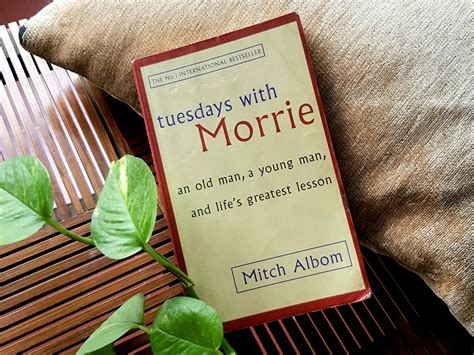Introduction

Mitch Albom’s “Tuesdays with Morrie” has profoundly moved millions with its poignant portrayal of a dying professor’s life lessons. If you’ve been touched by this masterpiece, you may be seeking similar literary experiences that explore end-of-life themes. Here’s a curated list of books that will resonate with your emotions and provide profound insights.
1. Being Mortal: Medicine and What Matters in the End by Atul Gawande
- Published: 2014
- Key Themes: Aging, end-of-life care, medical ethics
- Synopsis: Renowned surgeon and writer Atul Gawande reflects on the challenges and choices faced by individuals and healthcare professionals as they navigate the end of life. He argues for a shift in focus from extending life at all costs to ensuring a meaningful and dignified death.
2. When Breath Becomes Air by Paul Kalanithi
- Published: 2016
- Key Themes: Mortality, identity, medicine
- Synopsis: Neurosurgeon Paul Kalanithi pens a stunning memoir about his battle with terminal lung cancer. He explores the complexities of human existence, the search for meaning, and the power of love and connection in the face of death.
3. The Soul of a Butterfly: Reflections on Life’s Journey by Muhammad Ali
- Published: 2004
- Key Themes: Legacy, spirituality, adversity
- Synopsis: Boxing legend Muhammad Ali shares his reflections on life, faith, and the challenges he overcame. His words offer inspiration and encourage readers to live with purpose and embrace their own mortality.
4. The Book of Joy: Lasting Happiness in a Changing World by Dalai Lama and Desmond Tutu
- Published: 2016
- Key Themes: Joy, resilience, compassion
- Synopsis: Nobel Peace Prize laureates Dalai Lama and Desmond Tutu engage in a heartwarming conversation about the nature of joy. They explore how to cultivate inner peace, overcome adversity, and find happiness even in difficult times.
5. On Death and Dying by Elisabeth Kübler-Ross
- Published: 1969
- Key Themes: Grief, loss, bereavement
- Synopsis: This seminal work in the field of death studies provides a framework for understanding the five stages of grief: denial, anger, bargaining, depression, and acceptance. It offers compassionate guidance for individuals facing loss and their loved ones who support them.
6. The Last Lecture by Randy Pausch
- Published: 2008
- Key Themes: Meaning, purpose, inspiration
- Synopsis: Computer science professor Randy Pausch shares his final lecture before succumbing to terminal cancer. His heartfelt words about living fully, embracing challenges, and the importance of human connection leave a lasting impact.
7. The Field of Grace by John Berger
- Published: 2014
- Key Themes: Mortality, art, beauty
- Synopsis: Art critic John Berger reflects on mortality, the nature of beauty, and the interconnectedness of all living beings. His poetic language and profound insights offer a unique perspective on the end of life.
Table 1: Comparison of End-of-Life Themes
| Book | Major Themes |
|---|---|
| Tuesdays with Morrie | Mortality, life lessons, aging |
| Being Mortal | Medical ethics, end-of-life care |
| When Breath Becomes Air | Mortality, identity |
| The Soul of a Butterfly | Legacy, spirituality |
| The Book of Joy | Joy, resilience |
| On Death and Dying | Grief, loss |
| The Last Lecture | Meaning, purpose |
| The Field of Grace | Mortality, beauty |
Table 2: Common Mistakes to Avoid When Exploring End-of-Life Literature
| Mistake | Impact |
|---|---|
| Avoiding the topic altogether | Limits personal growth and understanding |
| Focusing solely on the physical aspects of death | Neglects the emotional and spiritual dimensions |
| Idealizing the dying process | Can create unrealistic expectations and disappointment |
| Dismissing the value of professional support | Grief counseling and end-of-life planning can provide essential guidance |
| Not engaging in introspection | End-of-life literature invites self-reflection and personal growth |
Tips and Tricks for Reading End-of-Life Literature
- Choose the right time: Select a moment when you’re open to reflecting on mortality and exploring deeper questions.
- Create a supportive environment: Find a quiet space where you can immerse yourself without distractions.
- Be patient: End-of-life literature can be emotionally challenging. Allow yourself time to process and reflect on the themes.
- Journal: Keep a journal to record your thoughts, insights, and questions as you read.
- Engage in discussion: Share your experiences and perspectives with friends, family, or a support group.
Frequently Asked Questions
Q: Why is it important to read end-of-life literature?
A: End-of-life literature helps us confront mortality, gain perspective on our own lives, and develop a deeper appreciation for the fleeting nature of existence.
Q: How can end-of-life literature help me prepare for my own mortality?
A: By exploring the experiences and perspectives of others, end-of-life literature can provide insights into how we might navigate our own end-of-life journey with meaning and dignity.
Q: What are some of the key lessons that end-of-life literature can teach us?
A: End-of-life literature can teach us the importance of living each day fully, valuing our relationships, embracing our individuality, and finding meaning in the face of adversity.
Q: Is it okay to feel sad or anxious when reading end-of-life literature?
A: Yes, it is perfectly normal to experience a range of emotions when reading end-of-life literature. Allow yourself to feel whatever emotions arise, and use them as a catalyst for personal growth.
Q: How can I ensure that I am being respectful of the experiences of those who are dying?
A: Approach end-of-life literature with empathy and sensitivity. Remember that the experiences of individuals facing death are deeply personal, and respect their perspectives and beliefs.
Conclusion
Reading books similar to “Tuesdays with Morrie” can be a profound and transformative experience. These literary works explore the complexities of life and death, offering insights, comfort, and inspiration. By engaging with these texts, we can deepen our understanding of mortality, cultivate greater compassion, and live our lives with greater purpose and meaning.
